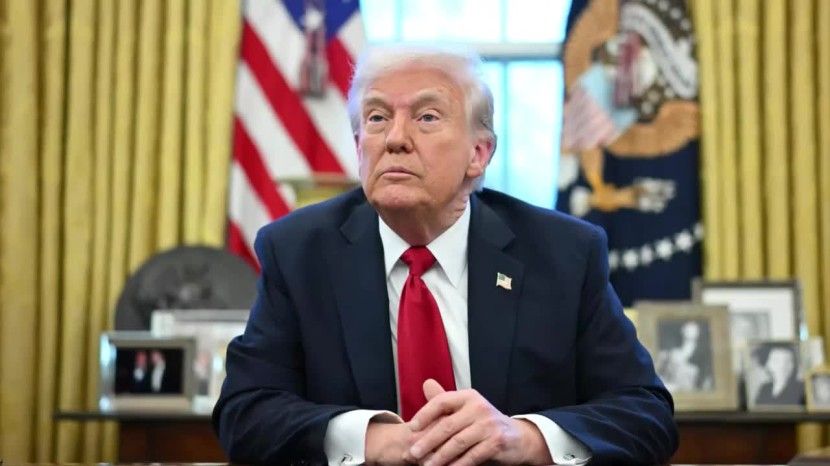
For months, the world has been left guessing about President Donald Trump's sweeping tariff plans. Now, on April 2—dubbed "Liberation Day" by the former president himself—some of those long-awaited answers will finally be revealed. But rather than offering clarity, Trump's announcement is expected to open a new chapter of economic uncertainty and international tension.
Trump has championed his "reciprocal tariffs" as a bold effort to reshape global trade, targeting what he sees as unfair practices by other nations. Yet, Wednesday's announcement may do little to calm businesses that have been anxiously awaiting stability since Trump's re-election in November. Instead, it could trigger a wave of retaliatory measures from major U.S. trading partners, fueling a full-scale trade war.
Trump's Last-Minute Decision-Making
Despite Trump's assurance that he has "settled" on a tariff plan, reports suggest that as late as Tuesday evening, White House advisers were still presenting him with multiple options. These included customized tariff rates per country, selective tariffs for certain nations, or a blanket tariff of up to 20% on all imports. One White House official told CNN that Trump was unlikely to finalize his decision until just hours before his 4 p.m. ET announcement in the Rose Garden.
Whatever Trump announces, it is expected to take "immediate effect," according to White House Press Secretary Karoline Leavitt. If true, this leaves foreign governments with virtually no time to negotiate, increasing the likelihood of swift countermeasures against American goods.
The Rationale Behind Trump's Tariffs
Trump has framed tariffs as a solution to four key challenges:
- Curbing the flow of fentanyl and illegal migration—a justification he has used for the 20% tariffs on Chinese imports and the threatened 25% tariffs on goods from Canada and Mexico.
- Leveling the playing field with trade partners—focusing on countries with higher tariff rates on U.S. exports and those with large trade surpluses with the U.S.
- Raising government revenue—suggesting tariffs could reduce the reliance on income taxes.
- Boosting domestic manufacturing—encouraging companies to shift production back to the U.S.
Trump has particularly zeroed in on reciprocal tariffs, targeting countries that impose higher tariffs on U.S. goods than what the U.S. charges them. This could hit developing economies—such as India, Brazil, Vietnam, and others—especially hard. According to a Morgan Stanley analysis, countries like Brazil, Indonesia, India, Thailand, and Vietnam have significant disparities in tariff rates compared to the U.S.
Even the European Union could be in the crosshairs, given its use of VATs and digital services taxes (DSTs), which Trump sees as trade barriers. European Commission President Ursula von der Leyen made it clear on Tuesday that the EU is prepared to retaliate. Other key trading partners—including Canada, Mexico, China, Japan, and South Korea—are also reportedly finalizing countermeasures.
China's Foreign Minister Wang Yi issued a stern warning, saying Beijing would "counterattack" if the U.S. continues its "blackmail." He added, "'America First' should not be American bullying."
A Preemptive Strike from Israel
Israel, taking a different approach, announced Tuesday that it would eliminate all tariffs on U.S. goods. It is the first country to do so since Trump's re-election, seemingly in an effort to avoid being caught in his tariff crossfire. However, there are doubts about whether even full compliance will shield any country from additional trade penalties.
The Economic Fallout: Recession Fears Grow
The economic impact of Trump's tariff strategy is already being felt, with the threat of further escalation looming. The uncertainty surrounding his pending tariff decisions has rattled markets and dragged down economic growth at a time when many American consumers are already struggling financially.
Goldman Sachs analysts recently warned that Trump's tariffs could stifle growth, with his fiscal policies unable to offset the damage. An aggressive, all-encompassing tariff approach could lead to higher consumer prices, market instability, and potentially tip the U.S. into a recession.
Still, Trump and his advisers remain steadfast. Leavitt stated on Tuesday that the administration's tax cuts and deregulation plans would help curb inflation and mitigate the negative effects of tariffs.
"It is going to work," she insisted.
With Trump's tariff measures set to take effect immediately, global markets and international leaders brace for impact. The world may not have to wait long to see just how deep this trade battle will cut.








